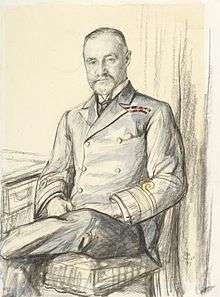Richard Phillimore
| Sir Richard Phillimore | |
|---|---|
 1917 portrait by Francis Dodd | |
| Born |
23 December 1864 Boconnoc, Cornwall |
| Died |
8 November 1940 (aged 75) Botley, Hampshire |
| Allegiance |
|
| Service/branch |
|
| Years of service | 1878–1929 |
| Rank | Admiral |
| Commands held |
HMS Mohawk HMS Juno HMS Adoukir HMS Inflexible 2nd Battle Cruiser Squadron 1st Battle Cruiser Squadron Reserve Fleet Plymouth Command |
| Battles/wars |
Boxer Rebellion World War I |
| Awards |
Knight Grand Cross of the Order of the Bath Knight Commander of the Order of St Michael and St George Member of the Royal Victorian Order |
Admiral Sir Richard Fortescue Phillimore GCB KCMG MVO (23 December 1864 – 8 November 1940) was a Royal Navy officer who went on to be Commander-in-Chief, Plymouth.
Naval career
Born the son of Admiral Sir Augustus Phillimore and educated at Westminster School,[1] Phillimore joined the Royal Navy in 1878.[2] He took part in the response to the Boxer Rebellion in 1900.[1] He was given command of HMS Mohawk in 1903 and then led the Naval Brigade Machine Guns in Somaliland the next year.[2] He was then given command of HMS Juno in 1907, HMS Aboukir in 1909 and the battlecruiser HMS Inflexible in 1911.[2]
He served in World War I as Commander of the 2nd Battle Cruiser Squadron and then as Principal Beach Master for the landings at Cape Helles in the Dardanelles in April 1915.[2] He went on to be liaison officer to the Imperial Russian Headquarters in 1915 and Commander of the 1st Battle Cruiser Squadron of the Grand Fleet in 1916.[2] He was then made Admiral commanding the Aircraft of the Grand Fleet in 1917[2] and took part in Second Battle of Heligoland Bight in November 1917.[1]
After the war, he was appointed President of the Postwar Questions Committee and then commanded the Reserve Fleet from 1920.[2] He was made Commander-in-Chief, Plymouth in 1923.[1] He was First and Principal Naval Aide-de-Camp to the King from 1928[1] and retired in 1929.[2]
He is buried at Shedfield in Hampshire.[1]
Family
In 1905 he married Violet Turton; they had three sons and one daughter.[1]
References
External links
- The Dreadnought Project: Richard Phillimore
| Military offices | ||
|---|---|---|
| Preceded by J de M Hutchison |
Officer Commanding HMS Juno May 1907 - May 1909 |
Succeeded by H J O Millar |
| Preceded by Sir Henry Oliver |
Commander-in-Chief, Reserve Fleet 1920–1922 |
Succeeded by Sir Douglas Nicholson |
| Preceded by Sir Montague Browning |
Commander-in-Chief, Plymouth 1923–1926 |
Succeeded by Sir Rudolph Bentinck |
| Honorary titles | ||
| Preceded by Sir Arthur Leveson |
First and Principal Naval Aide-de-Camp 1928–1929 |
Succeeded by Sir William Goodenough |